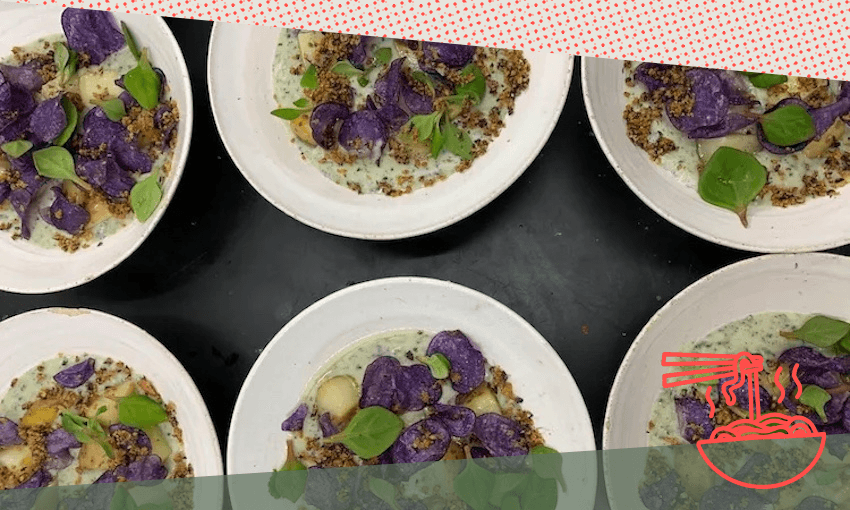What food traditions should we incorporate into our Matariki celebrations? The chef behind Feast Matariki has some simple suggestions.
This is an excerpt from our weekly food newsletter, The Boil Up.
2024 will be the third year Aotearoa has celebrated Matariki with a public holiday. Over the last two years, I’ve been lucky enough to not only learn about Matariki as part of my mahi, but to participate in building new traditions within my workplaces – traditions that, to my pleasure, revolved mostly around kai: a plate of pickled mussels, puha, pasta salad and frybread on a picnic table outside the staffroom; a hot mug of seafood chowder with a heavy slice of pillowy taro that probably would have tasted even better if we hadn’t had to cancel our scheduled hautapu due to rain.
This year, kai is foregrounded more than ever in our national Matariki celebrations as the theme for 2024 is Matariki Heri Kai — The Feast of Matariki, taken from the whakataukī ‘Matariki whetū heri kai’ meaning ‘Matariki, the bringer of food’. It’s a proverb that speaks to Matariki as a harvest festival; the association between Matariki rising in the wintry morning sky and the success or failure of the kai harvest, but also the stars in the Matariki cluster that are associated with the various domains from which we source our kai, in particular: gardens (Tupuānuku), forests (Tupuārangi), fresh water (Waitī) and ocean (Waitā).
Keen to start my own Matariki traditions outside of the workplace, I had a chat with Josh Hunter (Ngati Tūwharetoa), founder and chef for pop up series Whakapapa of your Kai as well as chef with next-level Ōtautahi-based caterers Base Food by Fire who will be cooking a hākari for 100 people tonight, the cornerstone event of Feast Matariki, a festival organised by Eat New Zealand and Ngāi Tahu.
When I call, Josh is with his mates Finbar MacCarthy and Matty Johns – a trio of legendary Canterbury chefs, just hanging out, drinking coffee and writing the menu for their next big event: a five-course feast at Stonehenge Aotearoa as part of Welly on a Plate. But before that, Josh has to cook a hākari, and beautiful produce has already started to arrive from across the Canterbury region and beyond.
“We’re breaking down a whole hog from Poaka, we’re dry-aging butterfish from Ocean Speared, we’ve got paua coming from Tora… the theme for the feast is Imagining Abundance, what it was like back in the day, so it starts with a pre-European menu.” My mouth is watering as Josh describes the menu: raw butterfish on a karengo crisp, kūmara parfait and urenika, classic creamed pāua with parāoa rēwena, butterflied fish with pickled mussels and clams swimming in a sauce made from the fish heads… and then it moves into post-European-contact times, when pigs arrived in Aotearoa along with various grain and vegetable crops. There’ll be a whole hog roasted for 12 hours, cabbages tucked in to roast with them so “that earthy, pig flavour permeates them” and then finally, the marae staple, that humble icon of local cuisine, steamed pudding, served with foraged black doris plum and a charcoal custard. Talk about imagining abundance! (Sidenote: I’m completely besotted by the idea of this custard – Josh tells me it’s super easy, you put charcoal in the cream to infuse just like you would a vanilla pod – “it tastes like burnt marshmallow.”)
When I ask about the inspiration behind his kai, especially the work he has done alongside Mitchell Teirney for Whakapapa of your Kai, Josh explains that he’s interested in the kind of kai Māori used to eat day to day, back in the day. “We don’t really do hāngī – it’s a lot of mahi and Māori weren’t cooking like that every day. Researching that kind of kai, you’ve got to read between the lines. It’s a lot of foraging, berries, funghi, protein, preserving and cooking over fire.”
But let’s say you don’t have the time or resources to research, to forage, to dig a hāngī pit, pickle fresh kaimoana or cook over fire. Let’s say you’re not much of a chef, or it’s a freezing cold Friday and thank god it’s a public holiday because you’re dead tired, recovering from winter ills. When I ask Josh if he has any ideas for how people can start their own Matariki traditions at home, his answer is simple. “Best way to do it is to text or Insta or Facebook 10 of your mates and have a potluck. Matariki is about catching up with loved ones, so bring something you like, everyone brings something and you have a kai together. It doesn’t have to be te ao Māori, Māori food. It’s about talking about the past, the present, and the future, our taha wairua, putting it all our different beliefs aside and sharing time and energy.”





